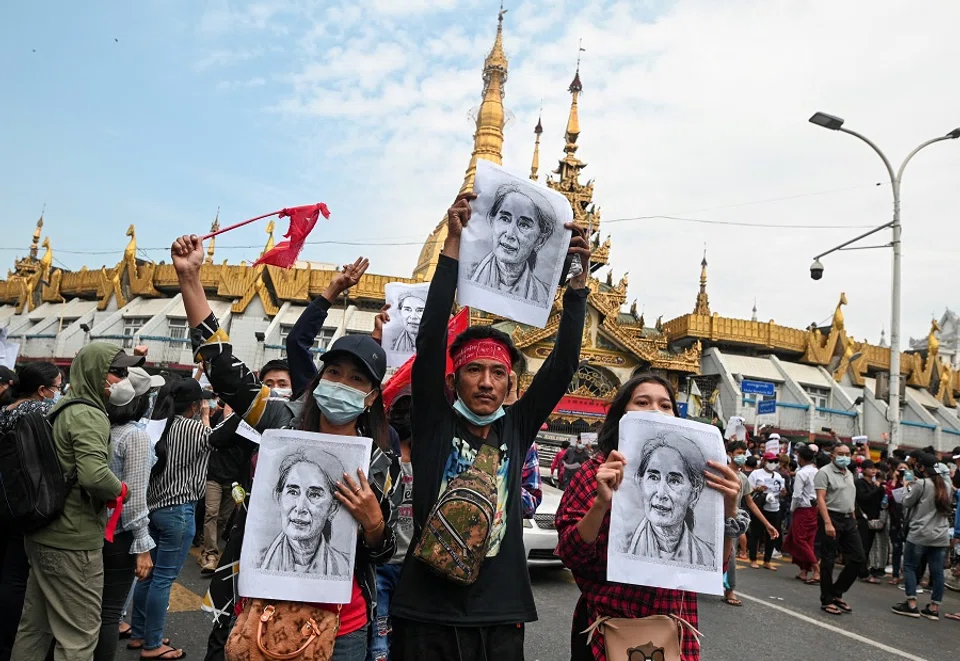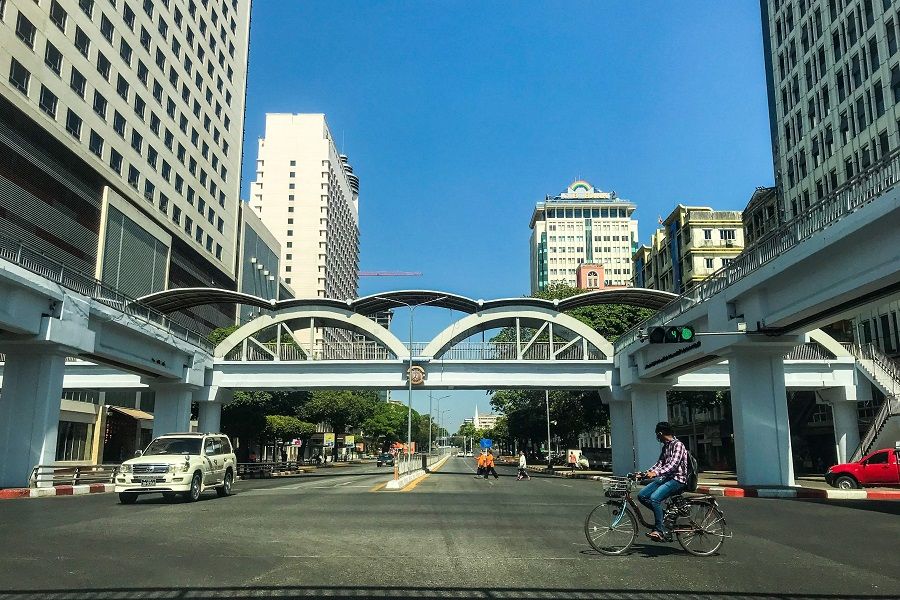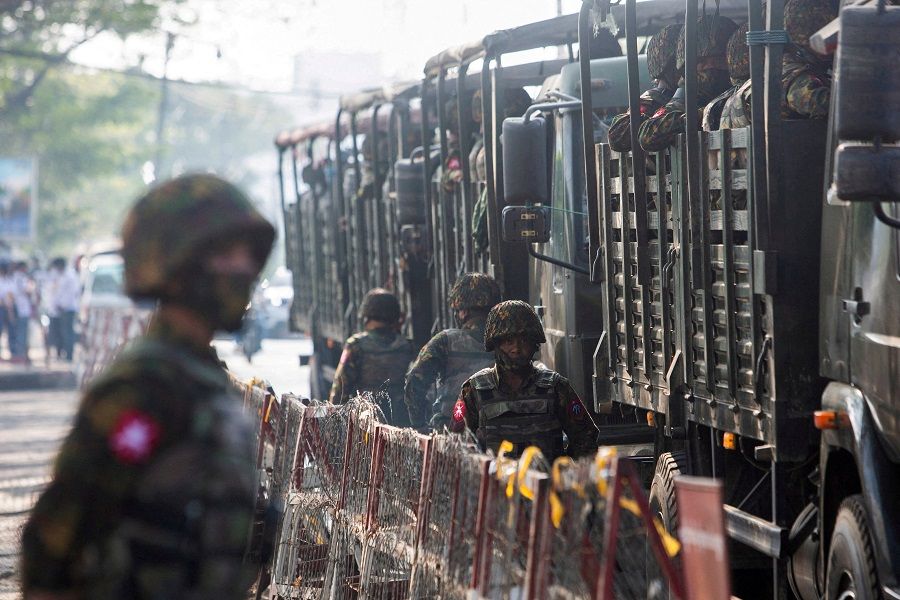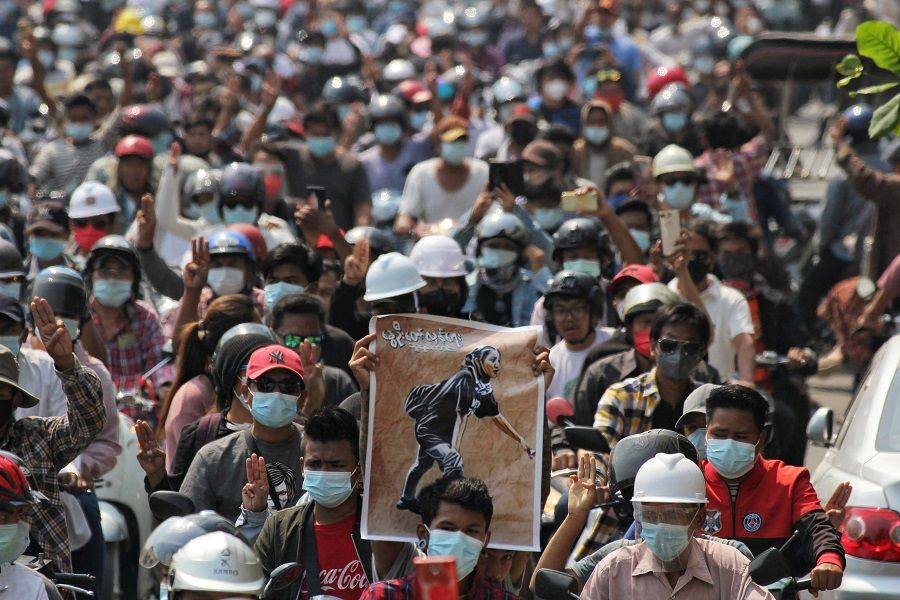A year on from the coup, Chinese New Year in Myanmar hijacked by politics

Chinese around the world ushered in the Year of the Tiger on 1 February. But for the Chinese in Myanmar, dark clouds loomed as it was also the one-year anniversary of Myanmar's military coup. Pro-democracy activists called for a peaceful "silent strike" against the military by closing stores and leaving the roads empty. This put the Chinese in Myanmar in a dilemma once again.
Since the coup, Myanmar has staged two silent strikes. The first was on 24 March 2021 when pro-democracy activists urged the people of Myanmar to mourn those who died in the protests, while the second was on the deeply symbolic Human Rights Day on 10 December 2021. In the latter, the military junta had just delivered its first verdict on pro-democracy leader Aung San Suu Kyi in a show of power, and the ensuing silent strike made clear that the people rejected military rule.
Given the preceding two strikes, the military junta could not allow a third silent strike to happen. The junta first announced that anyone taking part in the protest would face prosecution under various laws. Shortly after, they arrested several notable figures from Yangon and Pyin Oo Lwin, and confiscated some shops.
Next, to win the people's support, the junta announced that a commercial expo would be organised at the Hlaingthaya Industrial Zone in Myanmar's largest city of Yangon, while a bicycle race with the highest-ever prize money would be held in Myanmar's second largest city of Mandalay.

In addition, the market supervision departments of various cities also went door-to-door demanding store owners to sign an agreement stating that their store would remain open three days before and after 1 February. No valid reasons would be accepted for doing otherwise.
'Third-class' citizens
An owner of a market frequented mainly by the Chinese told me that after signing the agreement, many elderly Chinese store owners who usually stayed away from politics could not understand "why the government did not allow them to celebrate Chinese New Year". He said the junta's actions might encourage this group of Chinese to start paying attention to politics. As the saying goes, even if you do not care about politics, it will come knocking on your door.
The proposed silent strike was to take place at the start of the Spring Festival, but the military junta demanded that stores stay open while the pro-democracy camp urged people to stay in.
This business owner is a member of the National League for Democracy (NLD) in a certain city. Following the military coup, he laid low for a few months. When he returned home, he was assured of his safety as long as he did not participate in further political activities. But after the pro-democracy camp called for the silent strike, he received news that the junta might arrest would-be activists. Thus, after signing the agreement to keep his shop open, he asked his employees to tend the store while he left the city.
Proponents of the silent strike suggested an alternative for the shopkeepers who were made to keep their shops open - they could participate by staying indoors. These events show the junta's unpopularity with the people despite the fact that they hold the coercive power of the state.

Compared to other ethnic groups in Myanmar, the Chinese were in a worse predicament. The proposed silent strike was to take place at the start of the Spring Festival, but the military junta demanded that stores stay open while the pro-democracy camp urged people to stay in. Because of the juxtaposed events, whether the protests were pulled off or not, the Chinese could be made a scapegoat by both sides. Nobody cared about the Chinese's cultural need for celebrating Chinese New Year.
The Chinese in Myanmar have always suffered unequal treatment. While shouldering more responsibilities, they are denied equal rights and benefits. In fact, Myanmar has the most unequal citizenship policy in Southeast Asia: citizens are first categorised as either indigenous or foreign, and further divided into three categories on this basis. Most Chinese are either second-class or third-class citizens. Even if a minority of them are able to obtain first-class citizenship, because they are "foreigners", they will never enjoy the same amount of political rights as the indigenous citizens.
Third-class citizens only have voting rights, while second-class citizens have the additional right to join a party. Only first-class citizens have the right to run for election, but only native citizens can be elected as national leaders. If certain conditions are met, say a Chinese marries a first-class citizen, their third generation children can obtain first-class citizenship. However, their non-indigenous status can never be changed.
Although the Chinese are politically inferior to the rest, following the military coup, mainstream Myanmar society has been asking why the Chinese did not protest.
Excluded but will the plight of the Chinese soon change?
Although the Chinese are politically inferior to the rest, following the military coup, mainstream Myanmar society has been asking why the Chinese did not protest. It was not until a Chinese teenager named Kyal Sin lost her life during the protests that public opinion changed. Even so, Myanmar society (both opposing sides) have still not considered granting equal political rights to the Chinese in Myanmar.

Following the military coup, the pro-democracy camp designed an emblem as a call to unite all ethnic groups against the military. The image shows four women - one wearing a Myanmar outfit, another an Indian sari, another a Muslim burqa, and the last a nun's habit. Putting aside the mixing up of religion and ethnicity and whether it is appropriate to represent all Christians via a Catholic nun's habit, the intention behind the image is clear: the Myanmar outfit represents all the indigenous people while the outfits of the three remaining ethnicities (religions) represent non-natives living in Myanmar. Unfortunately, the designer did not think of adding a Chinese woman wearing a qipao in the image.
Observably, in the imagination of great unity among all ethnic groups led by the Myanmar people, the Chinese are excluded. This image was shared countless times on Facebook, and a large number of Chinese youths shared it as well. Yet they did not realise that they were not included in the image.
He had hoped to erase any trace of Chinese-ness in the trademark for a simple reason: "The Myanmar people dislike us, so we shouldn't show our Chinese identity."
A Chinese living in Yangon once told me about the changes he made to a trademark passed down from his parents. The trademark was of a name with Chinese cultural characteristics and an image of a Chinese dragon. He decided to remove the dragon and replace the Chinese name with Myanmar characters that had the same meaning. However, he was still unhappy because the Chinese-ness of the name was still apparent. He had hoped to erase any trace of Chinese-ness in the trademark for a simple reason: "The Myanmar people dislike us, so we shouldn't show our Chinese identity." To him, it was matter of course for the Chinese to be discriminated against.
A change in the perceptions of the Chinese will be an indicator of Myanmar society's modernisation and acceptance of universal values. This will require both the Myanmar people and the Chinese people to change.
Although in recent years, Myanmar has been facing a turbulent era, a positive outcome of this misfortune could be that all Myanmar people, regardless of ethnicity or religion, whether passively or actively, will go through the baptism of political civilisational lessons. While the effects of these lessons remain to be seen, this journey of civilisation will surely have a profound impact on the future course of Myanmar's politics.
Related: Why anti-China sentiments are growing in Myanmar and China is set to lose | Why Myanmar people believe there is Chinese involvement in Myanmar coup | Why China has everything to lose from Myanmar coup | Chinese researcher: Why China avoids taking a strong stand on Myanmar | Why Myanmar people are wary of a 'pauk-phaw' (sibling) relationship with China
